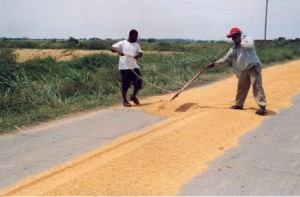Georgetown Chamber of Commerce and Industry (GCCI) President Chandradat Chintamani is calling for the creation of a government-funded credit facility to break the logjam of long-outstanding payments by rice millers to paddy farmers and the consequential frustrations which the farmers face.
Chintamani’s call, made during an exclusive interview with Stabroek Business a week ago, comes in the wake of mounting frustration among rice farmers over protracted delays in receiving payment for paddy sold to millers. “Farmers plant but they do not get the money to reinvest because the millers have not paid them. I think that it is time for the government to become involved in this process and to work with the millers to see how best we can get money back to the farmers,” he said.

The GCCI Chairman explained that the difficulties associated with the protracted delay in making payments to farmers were a function of the nature of the process. “You buy the paddy today, the process takes another four or five weeks before the paddy becomes a finished product after which that it exported. The overseas buyer may have a credit facility of perhaps six to eight weeks. What this meant, Chintamani said, was that millers are, in many cases, not able to make payments to farmers for their paddy for at least three months.
And according to Chintamani a point has now been reached where government should become involved. He said that he believed that a state-funded facility should be created that would enable millers to access money from that fund to pay the farmers in order to put them in a position to go back into their crop immediately, He said that since the government would have knowledge of payments being remitted from overseas buyers to millers in Guyana that would make it relatively easy for amounts to be recovered,
Chintamani said that he favoured the creation of such a facility financed by the government rather than the banking sector. ”The banking sector charges a high interest rate and we run the risk of making the industry non-competitive if we are asked to work through the banks and to deal with their interest rates. The government, on the other hand, can charge a notional interest rate in order to discourage the millers from not paying their account early. The whole idea is to create a pool of funds in the cycle,” Chintamani added.

The GCCI President told Stabroek Business that the viability of the rice sector was being threatened by the cycle of credit that drives the process. Chintamani explained that the farmers themselves acquire their pesticides fertilizer and seed paddy on credit and often harvest their paddy on credit adding that in such a scenario the farmer’s ability to pay his own considerable debts becomes seriously impaired if the miller does not meet his payments in a timely manner. “If we create the whole industry to rely on credit and one element fails then the whole industry fails. We clearly need some facility that limits that cycle of dependency on credit,” he added.
And according to Chintamani the proposed mechanism for the creation of greater liquidity within the cycle in the rice sector can impact positively on the agricultural sector as a whole.





